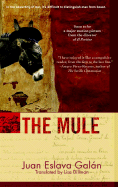

Corporal Juan Castro, in charge of the mules, marching on the side of the fascists in the Spanish Civil War, finds a lost mule in the fog that he names Valentina and adds to the military herd, hoping to take her home to his parents at the end of the fighting. Castro is the son of the groundskeeper of one of the richest men in Spain. Castro doesn't believe in reading books, can't imagine being anything more than a servant and has lost his best friend to the side of the Reds. He's a generous, well-meaning clod of the earth, and a likeable, down-to-earth hero who knows a lot about bird calls, hasn't heard of El Cid and never been in an elevator. When the battlefield erupts into gunfire and Valentina goes missing, Castro doesn't think twice about running across enemy lines to save her and launches the satirical plot into action.
This humane little comedy is packed with good-hearted moments. We're given enough glimpses of the war to know it's deadly serious, but we're given more instances of decent people remembering how to be decent. Besides, war isn't what the novel is about. The Mule is about lies--political lies, newspaper lies, military lies, romantic lies. Juan Castro starts out the story making a big fat blunder of a lie, but he's not the only one who isn't telling the truth. Neither is his best friend, Lieutenant Estrella, who writes Castro's romantic letters, nor is Concha, who has captured Castro's heart. Neither is Franco, who is about to become Spain's ruthless dictator, nor is Benavides, the terrified reporter sent to the front to get a story.
Except for the Nazi documentary film director, a broad caricature that's a bit too broad, the novel's humor is uniformly genuine, natural and good-natured. The bantering of the soldiers is occasionally laugh-out-loud funny, and when these tough guys cry and embrace their buddies fighting on the other side, the novel's heart becomes huge and transparent. Eslava Galan's style is straightforward and non-manipulative. He's strong and steady as a mule, with a good story to tell you that continues to surprise right up to the lump-in-your-throat ending.--Nick DiMartino

